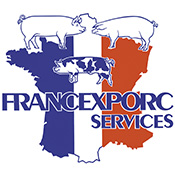Animal wellbeing
PARTICULAR ATTENTION AT ALL STEPS
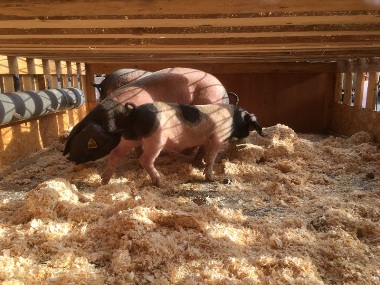
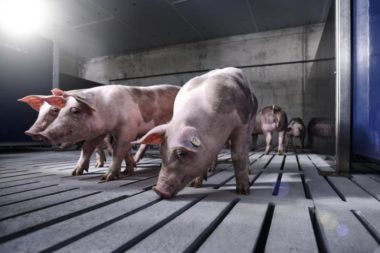
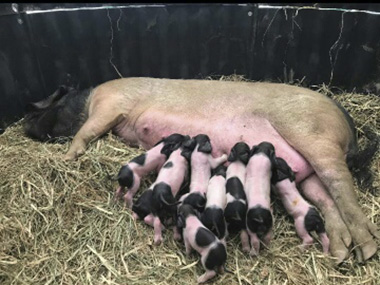
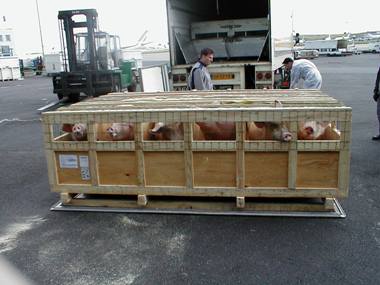
The World Organisation for Animal Health (OIE) provides a definition of animal welfare that is now a reference in the field. This definition refers to the main principles stated The World Organisation for Animal Health (OIE) provides a definition of animal welfare that is now a reference in the field.
This definition refers to the main principles stated by the Farm Animal Welfare Council (FAWC), a British government body, known as the Five Freedoms:
- Freedom from hunger and thirst – by ready access to fresh water and a diet to maintain health and vigour.
- Freedom from discomfort – by providing an appropriate environment, including shelters and comfortable rest areas.
- Freedom from pain, injury and disease – by prevention or rapid diagnosis and treatment.
- Freedom to express normal behaviour – adequate space and facilities, company of the animal’s own kind.
- Freedom from fear and distress – by ensuring conditions and treatment, which avoid mental suffering.
Over time, regulations have changed dramatically with people’s growing awareness of the duty to avoid all “unnecessary” suffering and to seek optimal living conditions for animals. An important legal framework is in place, at a national, European Community and international level.
Background and context
The sources of the law for the protection of animals exist on international, European Community and national levels:
- at the international level, with the OIE health codes for terrestrial and aquatic animals;
- at the European Community level with the Lisbon Treaty amending the European Union Treaty (Article 13);
- at the French national level with the rural, civil and penal codes.
In France, it is the 1976 law that has truly constructed animal welfare policy, by stating three fundamental principles:
- an animal is a sentient being, which must be housed in conditions compatible with its biological imperatives;
- it is an offence to mistreat animals;
- it is an offence to use animals in an abusive manner.
In 1999, thanks to a new animal welfare law, the French Civil Code was amended to ensure that animals, while remaining property, are no longer likened to things.
On 16 February 2015, the French Law on the Modernisation and Simplification of Law and Procedures in the Fields of Justice and Home Affairs, again amended the Civil Code by classifying animals as sentient beings: Art. 515-14. – Animals are living beings with feelings. Subject to the laws that protect them, the laws on property apply to animals.”
A societal evolution is underway
New societal expectations are emerging with regard to animal welfare:
- An evolution in the way people eat (vegetarianism, veganism, consumer preference for the free-range and organic sectors…) ;
- A lively debate on the status of animals which is translated both by the symposia or publications and by the bills which led to the modification of the Civil Code in 2015;
- Strong media coverage of animal welfare issues regarding farm animals and slaughter conditions;
- A reinforced challenge to French agricultural production by some animal welfare orgnaisations.
Several research projects are being developed to evaluate more precisely the welfare of farm animals, particularly within the European Union. The challenge is to develop measurable indicators of welfare (or a lack thereof) in order to be able to evaluate levels of animal welfare. This scientific research aims to change European and national legislation, aimed at protecting animals, by refocusing them on obligations of results rather than of means.
The role of the ministry
The French Ministry of Agriculture, Agrifood and Forestry develops the regulations in consultation with animal welfare organisations, professionals and scientists, and constantly adapts them according to evolutions in scientific knowledge and experience acquired in animal welfare. It also funds research programmes on animal welfare conducted by technical and scientific institutes (ANSES – the French Agency for Food, Environmental and Occupational Health & Safety, INRA – the French National Institute for Agricultural Research, and veterinary schools in particular).
CNOPSAV, the French National Advisory Council for Animal and Plant Health Policy is part of the Ministry of Agriculture and is consulted on guidelines for animal and plant health policy and can also be consulted on draft regulatory measures and any other questions relating to the health and protection of animals and plants. Within CNOPSAV, a group of animal welfare experts linked to the animal health section, has been set up, including scientific, professional and non-profit body representatives. Animal welfare issues are studied within the expert group before being validated in the animal health section and then in plenary session.
In each French department, the local authority directorates in charge of the protection of populations (DD(CS)PP) are responsible for applying these texts. For this purpose, they carry out regular inspections in accordance with a nationally or departmentally defined programme and targeted surveys. The national veterinary and phytosanitary investigation team assists veterinary services if investigations go beyond the territorial scope of a single French department. Every year, 15,000 inspections are conducted by the services of the French Ministry of Agriculture and Food to ensure the protection of animals.
